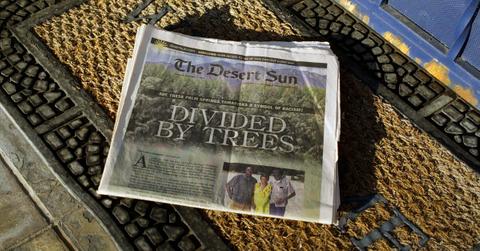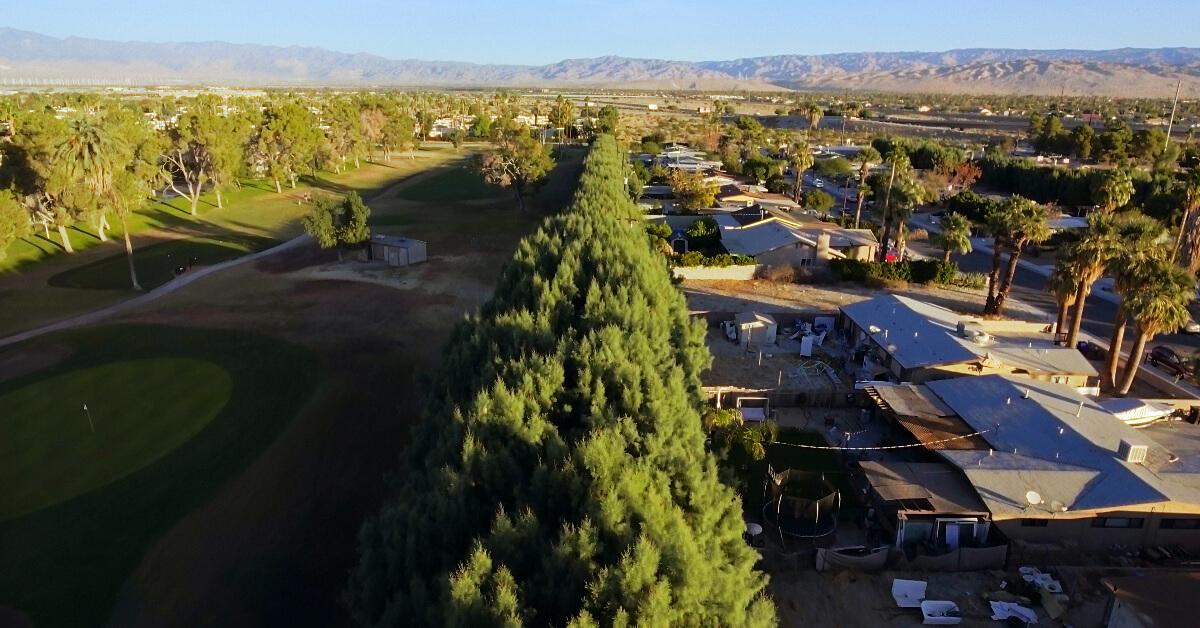'Racist Trees' Doc Exposes How Tree-Planting Can Be Used As a Weapon of Environmental Racism (Exclusive)
Published Jan. 22 2024, 4:37 p.m. ET

Provided caption: "One of several articles featured on the cover of the The Desert Sun that sparked international media attention and backlash against the so-called 'racist trees' that were planted in Palm Springs in the late 1950s."
A stimulating documentary premiering on PBS on Jan. 22, 2024, Racist Trees, explores ongoing racial tensions in one of the West Coast's most surface-level liberal hubs famous for mid-century modern architecture and Hollywood glitz: Palm Springs, Calif.
Directed and produced by Sara Newens and Mina T. Son, the film investigates the intentions of a line of tamarisk trees that was allegedly planted by the city in the late 1950s along the edge of the Tahquitz Creek Golf Resort. This invasive 60-foot wall of trees long isolated a historically Black Palm Springs neighborhood known as Crossley Tract — founded by Black entrepreneur Lawrence Crossley in 1956 — contributing to unlikely symbols of segregation well after the Civil Rights Act of 1964.

Provided caption: "A stunning view of the San Jacinto Mountains in Palm Springs, California that was obscured by a wall of Tamarisk trees affecting residents in the Crossley Tract neighborhood."
"We read Corinne Kennedy’s article about the tamarisk trees in The Desert Sun and were immediately intrigued," Sara Newens and Mina T. Son exclusively tell Green Matters via email. "This massive wall of trees served as a unique visual metaphor."
In conversation with Green Matters, the duo discussed the arousing facetiousness of their film's title, the problematic fantasy-driven vision of Palm Springs, and ongoing symbols of segregation in American society.
The documentary 'Racist Trees' exposes environmental racism in Palm Springs.
As per the NRDC, civil rights activist Dr. Benjamin F. Chavis Jr. coined the term environmental racism. It can be defined as any policy or action that intentionally harms marginalized groups including communities of color, Indigenous communities, and low-income communities.
The tamarisk trees issue in Palm Springs is clearly an example of environmental racism. From their initial 1950s planting until their better-late-than-never 2018 removal, the trees, along with an ugly chain link fence, alienated the Crossley residents, negatively impacting their overall well-being and property values.
Sara Newens and Mina T. Son exlpain their tongue-in-cheek documentary title, 'Racist Trees.'
Newens and Son say their purposely blunt title suggests that trees "can still be a symbol of systemic racism and oppression."
They explain: "We explore this in the film by asking questions around why the trees were planted in the first place and, more importantly, why they remained there for decades even after residents strongly opposed having them in their yards."
Native to Europe and Asia, the invasive shrub-like species is a "thirsty" plant that absorbs water and releases it into the air, as per the National Park Service. They threaten native plants, and can even displace natural habitats along the river.
The chain link fence and towering wall of tamarisk trees seem to mirror hostile architecture.
"One of the only places where you can find these tamarisk trees happens to be bordering a historically Black neighborhood, [indicating] how urban planning can be used to affect communities along racial lines," Newens and Son explain.

Director Mina T. Son
Newens and Son were fascinated by how "a bastion of liberal and progressive politics" could hide such darkness.
"Given the city’s image around inclusion and diversity, it was also fascinating that people in the city, particularly the city council members, didn’t want to talk about race," Newens and Son tell Green Matters.
"It wasn’t that long ago that Black families weren’t even allowed to live in Palm Springs proper and therefore settled on Section 14: Tribal land owned by the Agua Caliente Band of Cahuilla Indians," they explain. "In the late 1950s and early 1960s, city leaders used zoning restrictions to forcibly remove communities of color from their homes to make way for commercial development."
About more than invasive trees, the documentary analyzes systemic racism in a place often deemed a desert oasis, as well as Black liberation and the horrific razing of Section 14.
"Lawrence Crossley had the foresight to buy a plot of land on the outskirts of the city ... so that the displaced Black families from Section 14 had a place to live," the co-directors explain. However, these Section 14 families were not able to grow their wealth in the ways they had hoped, and are now seeking reparations from the city.
The co-directors explain that many Black individuals who came to Palm Springs were part of the Great Migration. When realizing this, they believe we can more clearly see "the continued patterns of Black people being denied the opportunity to be American."

Director Sara Newens
Here's where to watch the eye-opening documentary 'Racist Trees.'
Racist Trees premieres on Monday, Jan. 22, 2024, at 10 p.m. EST. on PBS as part of the Independent Lens anthology series. It will also be available via the PBS app.
Newens and Son were motivated to "look closely at systemic issues and explore the complexities and power dynamics of allyship in service of more nuanced and even uncomfortable conversations about race."
They hope Racist Trees inspires more "progress and change."